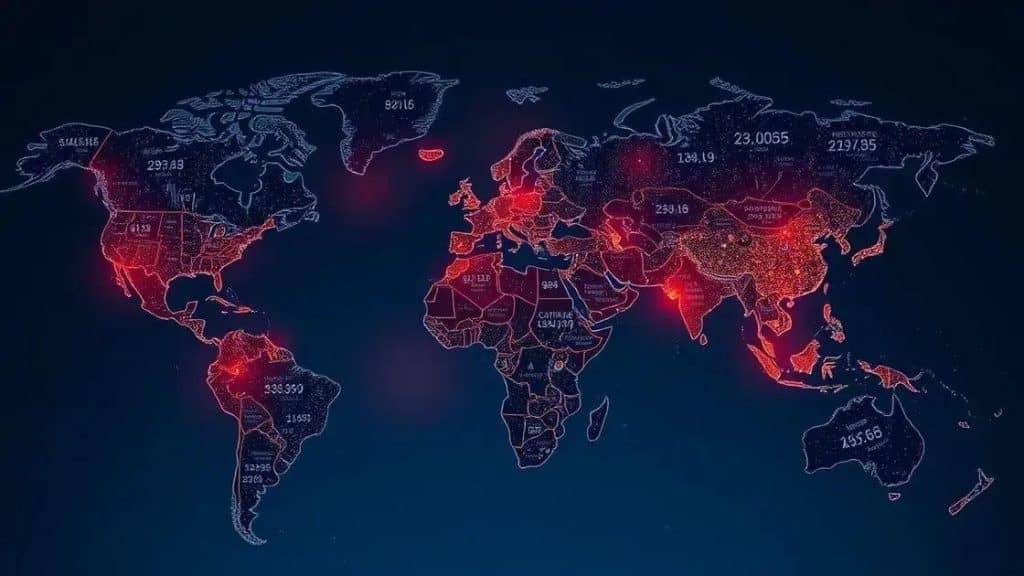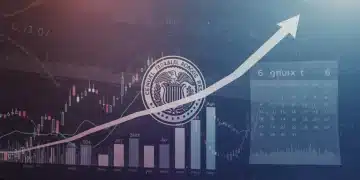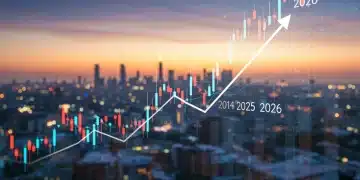hour global economic forecast: what to expect next

Being prepared for economic changes involves understanding market trends, building a financial safety net, diversifying income streams, and investing wisely to effectively navigate uncertainties.
The hour global economic forecast provides a snapshot of what may lie ahead for economies worldwide. Understanding these forecasts can help you anticipate changes in the market and make informed decisions. Curious about how the global economy will shape your financial future?
current global economic trends
Understanding current global economic trends is essential for any business or individual looking to navigate today’s market. These trends can significantly affect decision-making processes in investment, production, and even daily spending.
Key Drivers of Economic Trends
Several factors contribute to driving current economic trends. From government policies to consumer behavior, various elements shape the way economies function. As global connections grow deeper, the effect of these factors can be felt worldwide.
Major Current Trends
- The rise of digital currencies and their impact on traditional banking.
- Shifts towards sustainable practices influencing market behaviors.
- Inflation affecting purchasing power across nations.
- Labor market fluctuations and remote work shaping productivity.
These trends are interconnected. For example, the rise in inflation has prompted businesses to explore sustainable practices to reduce long-term costs. This shift not only benefits the environment but also strengthens a company’s reputation in a conscious market.
Furthermore, consumer preferences continue to evolve, with a noticeable trend toward supporting brands that emphasize ethical practices. As companies adapt to these preferences, they find new opportunities to attract and retain customers.
Impact of Global Events
Global events like political changes or natural disasters also play a critical role in shaping economic trends. For instance, unexpected geopolitical tensions can disrupt trade routes, leading to shortages and increased prices. Understanding such impacts can better prepare individuals and businesses to respond effectively.
By recognizing and analyzing these current global economic trends, individuals and businesses can make informed decisions. Staying ahead of these trends is crucial for success in an ever-changing landscape.
factors influencing the economic forecast
Various factors influencing the economic forecast can shape the outlook for the global economy. Understanding these elements is important for anyone looking to anticipate changes in market conditions.
Key Influential Factors
- Interest rates determined by central banks.
- Inflation trends affecting consumer purchasing power.
- Global trade agreements and tariffs.
- Technological advancements impacting productivity.
Each of these factors plays a crucial role in economic predictions. For instance, as interest rates rise, borrowing can become more expensive, leading to reduced consumer spending and investment. This change alters the economic landscape significantly.
Additionally, inflation can erode purchasing power, causing consumers to adjust their spending habits. Businesses, therefore, need to remain agile and adapt to these shifts quickly. Consider how fluctuations in global trade can create ripple effects across economies. Tariffs can make goods more expensive, altering supply chains and affecting local producers.
Impact of Consumer Behavior
Another significant factor is consumer behavior, which is influenced by psychological and societal trends. Economic confidence can drive spending. When consumers feel positive about the economy, they are likely to spend more, stimulating growth. Conversely, uncertainty can lead to reduced spending and investment.
Understanding how these factors influencing the economic forecast interact is key to predicting future trends. Policymakers and business leaders must analyze these elements closely to create strategic responses that can mitigate risks and take advantage of opportunities.
regional economic outlooks

The regional economic outlooks provide insight into how different areas are performing economically. By examining these regional trends, businesses and investors can better understand local markets and opportunities.
North America
In North America, economies are showing signs of strong recovery post-pandemic. Consumer spending has surged due to pent-up demand, contributing to economic growth. Key factors include rising employment rates and increased confidence among consumers.
Europe
Europe faces mixed economic signals. While some countries enjoy growth fueled by technological advancements, others struggle with inflation and energy costs. The European Central Bank is responding by adjusting interest rates to manage inflation while trying to support growth.
Asia-Pacific
The Asia-Pacific region remains a powerhouse, driven by robust manufacturing and technology sectors. Countries like China and India are seeing rapid growth, although challenges like supply chain disruptions and global competition persist.
- China’s growth is cooling but remains significant.
- India is emerging as a global tech hub.
- Southeast Asia is benefiting from increased foreign investment.
These regions are increasingly interconnected. Economic shifts in one region can have global implications, affecting trade and investment patterns. Monitoring these regional economic outlooks helps stakeholders make strategic decisions based on varying economic conditions.
In regions like Latin America, economic growth is uneven, with some countries facing barriers like political instability. Yet, opportunities exist in sectors like renewable energy, driven by a shift toward sustainability.
Africa
Africa’s economic outlook is brightening with investments in infrastructure and technology. Young populations and urbanization are driving growth, presenting new market opportunities for businesses willing to invest.
By analyzing these diverse regional economic outlooks, one can gain a deeper understanding of global trends and local dynamics that influence economic decisions.
impact of geopolitical events on the economy
The impact of geopolitical events on the economy is profound and can influence markets worldwide. Understanding these impacts is crucial for businesses and investors alike.
Economic Disruptions
Geopolitical tensions often lead to economic disruptions. Conflicts, sanctions, and trade wars can hinder the flow of goods and services, resulting in increased costs and uncertainty. For instance, when nations impose tariffs, it affects supply chains and prices globally.
As businesses adapt to these changes, they must also reassess their strategies to mitigate risks associated with geopolitical events.
Investment Shifts
Another notable effect of geopolitical events is the shift in investment strategies. Investors may pull out of unstable regions, leading to decreased foreign direct investment (FDI). Stable economies often see an influx of capital as investors seek security.
For example, during political unrest, investors tend to move their capital to more stable markets, which can lead to economic growth in those regions. This movement can also spur innovation as countries compete for investment.
Currency Volatility
The uncertainty caused by geopolitical events can lead to currency volatility. Investors may turn to safe-haven currencies like the US dollar or gold. This shift can significantly affect exchange rates, impacting international trade and investments.
The impact of geopolitical events on the economy is complex. It involves balancing the risks and potential rewards that come with political instability. As countries navigate these challenges, their economies must remain adaptable. Businesses that anticipate changes can position themselves for success.
how to prepare for economic changes
Being ready for economic changes is essential for both individuals and businesses. Understanding how to adapt can help mitigate risks associated with fluctuating markets and instability.
Understanding Market Trends
First, staying informed about market trends is crucial. Regularly follow economic news, reports, and analyses to understand what factors may affect your financial situation. Pay attention to indicators like inflation rates, unemployment statistics, and consumer confidence indices.
- Subscribe to reputable financial news sources.
- Utilize online tools for real-time economic data.
- Participate in webinars or workshops focusing on economic education.
Engaging in these activities helps you anticipate economic shifts and make informed decisions. It is about developing a proactive mindset that enables you to adapt efficiently.
Building a Financial Safety Net
Creating a financial safety net is another effective way to prepare. Having emergency savings can protect you during economic downturns. Aim to save at least three to six months’ worth of living expenses.
A safety net not only offers security but also provides flexibility. During times of economic uncertainty, this reserve can help cover unexpected expenses or allow for adjustments in spending.
Diversifying Income Streams
Diversifying income streams is also vital. This means exploring various income avenues, such as part-time jobs, investments, or passive income options. By not relying on a single source of income, you reduce your financial risks.
Consider options like rental properties, dividends from stock ownership, or online business ventures. This way, if one source of income decreases, others may still provide stability.
Investing Wisely
When investing, adopt a long-term perspective. Stay informed about potential risks and opportunities in the market. Consult financial advisors to help navigate complex investment landscapes.
Being cautious but optimistic helps you make strategic moves in unpredictable markets. Always be prepared to adjust your investment strategy as economic conditions change.
Learning how to prepare for economic changes allows you to react swiftly to unexpected events. Adopting a proactive and informed approach equips you to navigate through challenging financial times effectively.
In conclusion, preparing for economic changes is vital in today’s fast-paced world. By understanding market trends, building a financial safety net, and diversifying income streams, you can better manage uncertainties. Investing wisely and staying informed will empower you to face challenges head-on. Adopting these strategies equips you with the tools necessary to navigate through any economic shift successfully.
FAQ – Preparing for Economic Changes
Why is it important to stay informed about market trends?
Staying informed helps you anticipate changes and make smarter financial decisions that can protect your investments.
How much should I save for an emergency fund?
It is recommended to save at least three to six months’ worth of living expenses to cover unexpected costs.
What are some ways to diversify my income?
You can diversify your income by exploring part-time work, investments, or passive income streams like rental properties.
How can I ensure my investments are safe during economic changes?
Consulting financial advisors and regularly reviewing your investment strategy will help you adapt to economic shifts.





